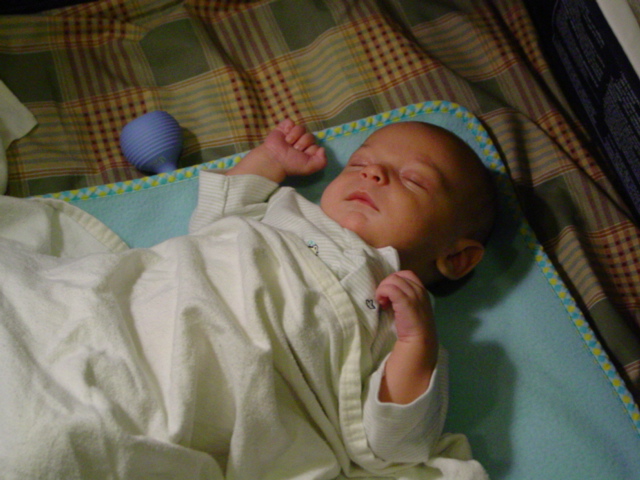How to Get Baby to Sleep Through the Night
Disclaimer: This post is from a guest contributor who differs a little from the way we parent. We want our blog to be diverse enough for all families to be able to gather information to find what works for them. No judgement here. Thank you!
Being a baby is a fun time to be alive. My little ones made that clear from the get-go. There was so much to get excited about, they couldn’t calm down long enough to sleep—and all through the night? Forget about it! Teaching each of my kids to sleep at night took a lot out of us but we learned so much in the process. Here are some tips my husband and I found to be super useful.
Give the Baby Space
Training your baby to sleep through the night usually happens around 6 months. This coincides with a time when pediatricians believe that it’s OK for your baby to sleep in another room without a baby co-sleeper right next to your bed.

You probably know this, but I’ll say it to make sure. Beyond the more obvious dangers of the outside world, I don’t think we can overemphasize how careful you must be, considering all the things that can potentially harm your kid at home. As tempting as it may be to cuddle your little one to sleep, your baby should never actually sleep with you in your bed. The risk of Sudden Infant Death Syndrome (SIDS) is very real. Be mindful of the position your baby is placed in when you put them down for a nap or for the night. Sleeping on their side or tummy greatly increases the chances of SIDS.
Keep Your Baby Close
Keeping your baby in your room is also a good idea if the alternative is sharing a room with a sibling. The challenges of sleep are greater during the critical months of sleep training, so you don’t want an excited big brother or sister ruining your techniques. If sharing a room becomes too big of a disturbance for your other kids, bring baby back into your room. Do not be discouraged, because babies generally learn how to sleep properly pretty quickly. Before you know it, you will be wishing baby would wake up so you don’t have to hear their non-stop snoring!
Routine
Every baby is different, but the general guidelines around the number of hours your baby should be sleeping through each night are:
- Newborns to 3 months old: 8.5 hours
- 3 to 6 months old: 9 hours
- 6 to 9 months old: 10 hours
- 9 to 12 months old: 11 hours
To prepare your child for sleep, set a routine with a regular meal time and calming sounds or songs that you cue up when bedtime rolls around. Pro tip: play music from a familiar TV show before your infant goes to bed, that way they’ll associate the song with sleep in the future. If you can’t find a song that does the trick, know that some babies prefer white noise to actual music. Keep outside noises out with Sound Absorbent Panels.
Stop Midnight Snacking
Breastfeeding is a beautiful thing. But I know I’m not alone in looking forward to it being over. The good news is that no longer nursing at night actually helps your baby out when you’re trying to sleep train. I always thought my kids would cry because they were starving and couldn’t possibly sleep until they’d been fed. What I eventually found out was the complete opposite. All my kids have slept better when the midnight snacking stopped. This was a huge turning point for us, and allowed everyone in the house to get a better night’s sleep.
The bottom line is that, like most adults, 6-month-olds are fully capable of making it through the night without eating. The vast majority of babies that cry will settle back into sleep much faster if you do not intervene. This is especially true with time, as your baby will understand that crying does not lead to the reward of food. If you’re not sure if this is the right move, open up a conversation with your pediatrician to see if they think you can stop the nighttime feeding habit.
When it comes to sleep training, it’s all trial and error. Be patient with yourself and try to get as much sleep as you can so you can to be there for your baby during this exciting stage in their development. To alleviate the stress of sleep-deprived parenting and improve your baby’s sleep, you should consider hiring help for newborn sleep schedule.
